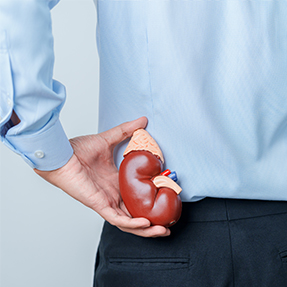
Possibilities of why you keep getting recurrent kidney stones
Kidney stones, or nephrolithiasis, are a common condition affecting up to 12% of Americans who will be diagnosed with them at some point in their life. Men have a higher incidence than women of experiencing the excruciating pain of passing a kidney stone, often described as worse than childbirth.
Unfortunately, anyone with one kidney stone has a 35% to 50% chance within five years, without making lifestyle changes, of it happening again. This makes it imperative for all of us to understand kidney stones, their symptoms, causes, and why you may be at risk for recurring stones to form.
What are kidney stones?
Next to our brain and heart, the kidneys are organs we cannot live without. Every day, our body accumulates waste material that needs removal which is the kidney’s job. Healthy kidneys help remove wastes from the blood that makes urine which is expelled several times daily, from our bodies. Our kidneys also control the levels of several minerals, including calcium, sodium, and potassium.
Kidney stones form from the hard deposits of minerals and salts when our urine is not dissolving these minerals adequately. This results in stones that impact the urinary system.
There are four types of kidney stones people can develop:
1.Calcium – This is the most common type, usually in the form of calcium oxalate
2.Struvite – Often caused by a urinary tract infection, struvite stones can grow large with few symptoms
3.Uric acid – People who lose water quickly when afflicted with diarrhea, eating a high protein diet, or have malabsorption issues, are more likely to develop this type of stone
4.Cystine – If a person has cystinuria, a hereditary condition that causes excess excretion of amino acid from the kidneys, they have a higher chance of getting this type of stone.
Symptoms and causes of kidney stones
Kidney stones can be painful but in different ways for different people. Some people feel severe, sharp pain in their back right below the ribs which is the location of your kidneys. This pain may radiate into the lower abdomen and groin, causing pain. Urinating can be painful or have a burning sensation. Urine color, smell, and consistency may change to pink urine, cloudy, and foul smelling. Urine frequency often increases. Other symptoms may include nausea and vomiting or fever and chills.
Causes of kidney stones are varied but can include the following:
- Inadequate fluid intake, particularly of water
- Certain foods that promote stone formation in susceptible people
- Hypercalciuria – a familial condition in which urine contains unusually large amounts of calcium.
- Family history of kidney stones
- Cystic kidney diseases are disorders that cause fluid-filled sacs to form in the kidneys
- Hyperparathyroidism – a condition in which the parathyroid glands release too much hormone, causing extra calcium in the blood.
- Gout – a disorder that causes painful swelling of the joints
- Blockage of the urinary tract
- Chronic inflammation of the bowel
- A history of gastrointestinal tract surgery
- Taking diuretics – medications that help the kidneys remove fluid from the body
- Calcium-based antacids
- The protease inhibitor indinavir (Crixivan) a medication used to treat HIV infection
- The anti-seizure drug topiramate (Topamax)
Possible causes of recurrent kidney stones
Not everyone will have recurrent kidney stones. But, up to one-third or one-half of people with a previous kidney stone diagnosis are likely to be diagnosed with them again in the future.
Here are some possible reasons why you may have recurrent kidney stones:
- You need to lose weight
- You need to eat a healthier diet
- You need to drink more water throughout the day, especially if you are chronically dehydrated or following a high protein, salt, or sugar. It’s recommended that up to 3 liters of water per day or 13 8-ounce glasses of water. However, this also depends on a person’s weight and other factors. It’s best to get your doctor’s opinion for your specific needs.
- You need to reduce your animal protein intake if you are consuming too much. For example, red meat can increase uric acid levels
- Reduce sodium intake to no more than 2000 mg/day
- Review your medications. Medications for migraines and depression, excessive use of laxatives, using calcium-based antacids, and taking vitamin C can increase the risk of kidney stones.
There is also the possibility recurrent kidney stones are caused by hereditary or genetic conditions which include:
- Cystinuria – This condition raises the amount of cystine (an amino acid) in urine that crystallizes and forms stones
- Primary hyperoxaluria – Genetic disorders causing the liver to overproduce oxalate, that can crystallize forming stones
- Cystic fibrosis – this hereditary condition is linked to increasing oxalate while reducing the chemical required to break down oxalate
- GI conditions that trigger chronic diarrhea, Crohn’s disease, inflammatory bowel disorder, hyperparathyroidism, gout, diabetes, or gastric bypass surgery
If you have tried the above suggestions with no luck, work with your nephrologist or urologist to find the root cause of recurrent kidney stones.
Dr. David Samadi is the Director of Men’s Health and Urologic Oncology at St. Francis Hospital in Long Island. He’s a renowned and highly successful board certified Urologic Oncologist Expert and Robotic Surgeon in New York City, regarded as one of the leading prostate surgeons in the U.S., with a vast expertise in prostate cancer treatment and Robotic-Assisted Laparoscopic Prostatectomy. Dr. Samadi is a medical contributor to NewsMax TV and is also the author of The Ultimate MANual, Dr. Samadi’s Guide to Men’s Health and Wellness, available online both on Amazon and Barnes & Noble. Visit Dr. Samadi’s websites at robotic oncology and prostate cancer 911.
